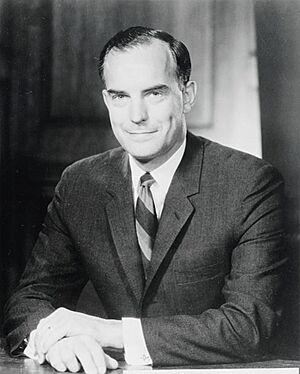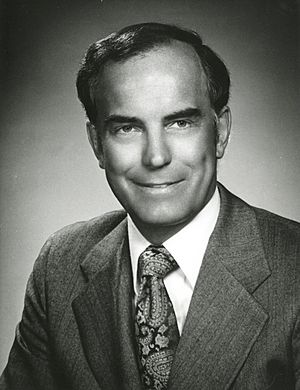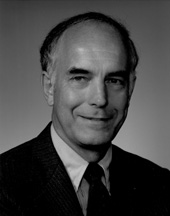Daniel J. Evans facts for kids
Quick facts for kids
Daniel J. Evans
|
|
|---|---|

Official portrait c. 1965–1968
|
|
| United States Senator from Washington |
|
| In office September 8, 1983 – January 3, 1989 |
|
| Preceded by | Henry M. Jackson |
| Succeeded by | Slade Gorton |
| 2nd President of Evergreen State College | |
| In office June 6, 1977 – September 8, 1983 |
|
| Preceded by | Charles J. McCann |
| Succeeded by | Joseph D. Olander |
| Chair of the National Governors Association | |
| In office June 3, 1973 – June 2, 1974 |
|
| Preceded by | Marvin Mandel |
| Succeeded by | Cal Rampton |
| 16th Governor of Washington | |
| In office January 13, 1965 – January 12, 1977 |
|
| Lieutenant | John Cherberg |
| Preceded by | Albert Rosellini |
| Succeeded by | Dixy Lee Ray |
| Minority Leader of the Washington House of Representatives | |
| In office January 9, 1961 – January 11, 1965 |
|
| Preceded by | August P. Mardesich |
| Succeeded by | John L. O'Brien |
| Member of the Washington House of Representatives from the 43rd district |
|
| In office January 14, 1957 – January 11, 1965 |
|
| Preceded by | R. Mort Frayn |
| Succeeded by | Newman H. Clark |
| Personal details | |
| Born |
Daniel Jackson Evans
October 16, 1925 Seattle, Washington, U.S. |
| Died | September 20, 2024 (aged 98) Seattle, Washington, U.S. |
| Political party | Republican |
| Spouse |
Nancy Bell
(m. 1959; died 2024) |
| Children | 3 |
| Education | University of Washington (BS, MS) |
| Military service | |
| Allegiance | |
| Branch/service | |
| Years of service | 1943–1946 1951–1953 |
| Battles/wars | World War II Korean War |
Daniel Jackson Evans (born October 16, 1925 – died September 20, 2024) was an important American politician from Washington state. He was a member of the Republican Party.
Evans served as the governor of Washington from 1965 to 1977. Later, he was a member of the United States Senate from 1983 to 1989. After serving in the United States Navy, Evans was first elected to the Washington House of Representatives in 1956.
He became the Republican leader in the House before being elected governor in 1964. He won re-election twice more in 1968 and 1972. Evans was known as a moderate Republican, especially on social and environmental issues. He supported Nelson Rockefeller for president in 1968 and did not endorse Richard Nixon, even though he gave a major speech at the Republican National Convention that year.
Evans was considered as a possible candidate for vice president of the United States during his time as governor. In 1983, he was chosen to join the United States Senate after Senator Henry M. Jackson passed away. He won a special election later that year and served until 1989, choosing not to run again. When he died, he was the oldest living former senator and the second-oldest living American governor.
Contents
Early Life and School
Daniel Evans was born on October 16, 1925, in Seattle, Washington. His family had lived in the Washington Territory since 1859. His grandfather even served in one of Washington's first state senates. Daniel grew up in the Laurelhurst neighborhood and went to Roosevelt High School.
As a young man, Evans was an Eagle Scout, which is the highest rank in Boy Scouts. He worked as a staff member and Hike Master at Camp Parsons, a well-known Boy Scout camp in Washington State. In 1973, he received the Distinguished Eagle Scout Award from the Boy Scouts of America.
After high school, Evans joined the United States Navy and served from 1943 to 1946. He was part of a college training program at the University of Washington (UW) and later at the University of California, Berkeley. He was deployed to the Pacific Ocean shortly after World War II ended. He served as an ensign on aircraft carriers before returning to UW in 1946.
Evans graduated from the University of Washington with degrees in civil engineering in 1948 and 1949. In 2007, the UW gave him their highest honor for graduates, the Alumnus Summa Laude Dignitatus. He returned to the United States Navy from 1951 to 1953. After that, he worked as a structural engineer from 1953 to 1956. In this role, he helped design parts of the Alaskan Way Viaduct in Seattle.
Political Career
Evans served in the Washington State House of Representatives from 1957 to 1965. After that, he was elected governor.
Even though he was a Republican and called himself a conservative, Evans became known for his more liberal policies. He cared a lot about protecting the environment. He even started the country's first state-level Department of Ecology. This agency became a model for the federal Environmental Protection Agency. He also strongly supported the state's higher education system, including starting Washington's system of community colleges.
Governor of Washington (1965–1977)
Evans announced he would run for governor in December 1963. He won the election in 1964, defeating the current Democratic Governor Albert Rosellini. He served as governor until 1977. He was one of only three governors in Washington state history to be elected to three terms.
A study in 1981 named him one of the ten best American governors of the 20th century. He decided not to run for a fourth term in 1976.
From 1977 to 1983, Evans was the second president of Evergreen State College in Olympia, Washington. Evans had helped create this college in 1967 by signing a law that allowed it to be formed. The largest building on the Evergreen campus is named the Daniel J. Evans Library in his honor.
Evans was considered as a possible running mate for Richard Nixon in the 1968 presidential election, but he chose not to be considered. Gerald Ford also thought about nominating him for vice president in 1974 and as a possible running mate for the 1976 election.
United States Senator (1983–1989)
In 1983, Governor John Spellman appointed Evans to the United States Senate. This was to fill a seat left empty by the death of long-time senator Henry M. Jackson. Evans won a special election later that year against Mike Lowry. He served the rest of Jackson's term and then retired from politics after the 1988 elections.
He wasn't very happy during his time in the Senate. In a 1988 article, he wrote that "debate has come to consist of set speeches read before a largely empty chamber." He also felt discouraged by "bickering and protracted paralysis."
Evans voted to create Martin Luther King Jr. Day as a federal holiday. He also voted for the Civil Rights Restoration Act of 1987. He even voted to override U.S. President Ronald Reagan's veto of that act. Evans voted in favor of Robert Bork's nomination to the Supreme Court of the United States, which was not approved by the Senate.
Later Life and Legacy
After leaving the Senate in 1989, Evans started his own consulting company, Daniel J. Evans Associates. Governor Mike Lowry appointed him to the Board of Regents for the University of Washington in 1993. Evans was the board's president from 1996 to 1997. In 1999, the Evans School of Public Policy and Governance at the University of Washington was named after him.
Evans also worked in media, giving weekly editorials on the KIRO-TV newscasts in the 1990s. In 2012, he was listed as a director for the Initiative for Global Development. His autobiography, a book about his own life, was published in 2022. He became the oldest living former U.S. senator after James L. Buckley died in August 2023. On January 26, 2024, his wife of 64 years, Nancy Bell, passed away at age 90.
Daniel Evans died at his home in Seattle on September 20, 2024, at the age of 98. He was the last living former U.S. senator who was born in the 1920s.
Protecting Wilderness
Daniel Evans was a Boy Scout who loved hiking in the Olympic Mountains. This led to a lifelong passion for protecting wilderness areas. Evans supported Congress's decision to create North Cascades National Park in 1968.
As governor, he convinced President Gerald Ford to sign a law in 1976 that created the Alpine Lakes Wilderness Area. This happened even though the U.S. Forest Service wanted to stop it. As a U.S. senator, Evans helped create the million-acre Washington Park Wilderness Act. He also supported laws to create the Columbia Gorge National Scenic Area.
In 1989, Evans co-founded the Washington Wildlife and Recreation Coalition with Mike Lowry. In 2017, a part of Olympic Wilderness was renamed the Daniel J. Evans Wilderness in his honor.
Images for kids



